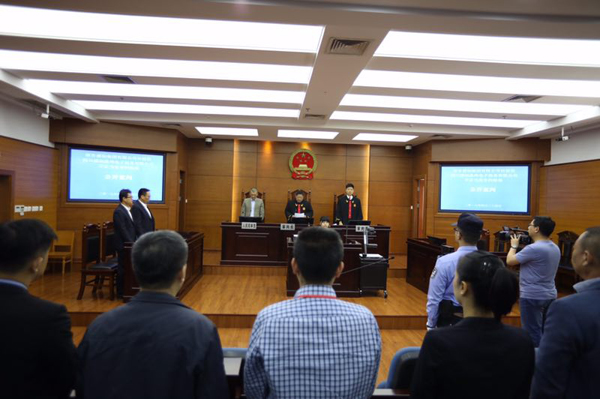Wuxi court rules on first IoT intellectual property case

The Xinwu District People's Court rules on the first intellectual property rights infringement case in the IoT field to be heard in Wuxi on April 24. [Photo provided to chinadaily.com.cn]
Xinwu District People's Court gave its verdict on the first intellectual property rights infringement case in the IoT field to be heard in Wuxi on April 24, two days ahead of World Intellectual Property Day.
The verdict protected World Sensing Net Group's (WSN) IP rights to it's "sensing(感知)" brand name, requiring the defendant, Sensing Dingkun E-commerce Co to cease using the word "sensing" and compensate WSN with 500,000 yuan ($ 7,430) for damage to its brand and reputation.
Liu Haitao, chairman of World Sensing Net Group (WSN) and chief scientist of the National 973 Plan, started to explore the IoT field with his team in 1999, and established the company in Wuxi a decade later.
Thanks to the hard work of his team over the past decade, the "sensing" brand has developed into a multinational enterprise and won global recognition for its work.
Sensing Dingkun E-commerce Co was established in Sichuan province in 2013 without "sensing" in its company name. Its legal representative, Zhu Guolong is a former employee of WSN. It was after Zhu joined Dingkun that the e-commerce company registered to add the word "sensing" to its name in 2016.
"Sensing Dingkun, knowing that 'sensing' is an important part of WSN's brand, decided to add it to its company name and change the name of its e-commerce platform accordingly. Following that, the Sichuan company added Liu Haitao's photos and name to its shareholder list. The company's decision to state or imply to the public that it is closely related to WSN effectively piggybacked onto WSN's reputation and name, easily leading to confusion for consumers and damaging the legitimate rights and interests of WSN," said Dai Hongfeng, presiding judge of the court's IPR division.
Dai went on to encourage local companies to attach importance to the protection of intellectual property.
"They copied an important element of our brand that we had painstakingly built up over the past decade; the fact that we won the lawsuit demonstrates the business-friendly environment of Xinwu district, and that our country is paying more attention to protecting intellectual property", said Liu.
With the rapid development of technology, local companies increasingly need legal aid services to protect their products.
Indeed, many entrepreneurs attended the Wuxi trial, with some voicing their own concerns about IP protection in a meeting following the conclusion of the case.
"I think the district is setting a really good example by taking a tough line on IP protection; it will help entrepreneurs to invest with confidence here", said Gu Xihong, manager of Wuxi Double Elephant Micro Fibre Material Co.
In order to further promote the development of a local IoT industrial cluster, the district's court will set up an office in Jiangsu Internet of Things Research and Development Center and Wuxi Internet of Things Innovation Center Co on April 26, in order to provide legal support for the development of the internet of things industry.
One thing is for sure –– anyone considering infringing IP rights might want to think twice before doing it in Xinwu district, they may well end up paying a high price.



